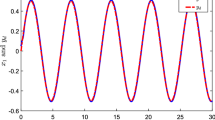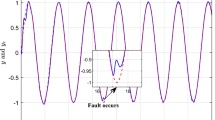Abstract
This paper mainly addresses the finite-time tracking problem of pure-feedback systems with indifferentiable non-affine functions. A novel adaptive fuzzy finite-time command filtered scheme is proposed by remodeling the non-affine functions. The control scheme consists of the fuzzy logic systems with modified minimal learning parameter technique, the command filtered scheme and the finite-time error compensation system. The finite-time convergences of tracking error and all closed-loop signals are proved by using the finite-time stability theory. The contributions of this paper are that the new controller can achieve finite-time convergence, relax the restriction conditions that the non-affine functions must be derivative and strictly positive or negative and reduce the computational load significantly. Finally, a simulation example is given to validate the effectiveness of the developed control technique.






Similar content being viewed by others
References
Niu, H., Yu, J.P., Yu, H.S., Lin, C., Zhao, L.: Adaptive fuzzy output feedback and command filtering error compensation control for permanent magnet synchronous motors in electric vehicle drive systems. J. Frankl. Inst. 354(15), 6610 (2017)
Ji, Y.H., Zhou, H.L., Zong, Q.: Adaptive neural network command filtered backstepping control of pure-feedback systems in presence of full state constraints. Int. J. Adapt. Control Signal Process. 33(5), 829 (2019)
Yu, Z.X., Yan, H.C., Li, S.G., Dong, Y.: Approximation-based adaptive tracking control for switched stochastic strict-feedback nonlinear time-delay systems with sector-bounded quantization input. IEEE Trans. Syst. Man Cybern. Syst. 48(12), 2145 (2018)
Li, D.P., Li, D.J., Liu, Y.J., Tong, S.C., Chen, C.L.P.: Approximation-based adaptive neural tracking control of nonlinear MIMO unknown time-varying delay systems with full state constraints. IEEE Trans. Cybern. 47(10), 3100 (2017)
Wang, M., Ge, S.Z.S., Hong, K.S.: Approximation-based adaptive tracking control of pure-feedback nonlinear systems with multiple unknown time-varying delays. IEEE Trans. Neural Netw. 21(11), 1804 (2010)
Wang, X.J., Li, X.Y., Wu, Q.H., Yin, X.H.: Neural network based adaptive dynamic surface control of nonaffine nonlinear systems with time delay and input hysteresis nonlinearities. Neurocomputing 333, 53 (2019)
Guo, J.H., Luo, Y.G., Li, K.Q., Guo, L.: Adaptive dynamic surface longitudinal tracking control of autonomous vehicles. IET Intell. Trans. Syst. 13(8), 1272 (2019)
Liu, Z.C., Dong, X.M., Xue, J.P., Li, H.B., Chen, Y.: Adaptive neural control for a class of pure-feedback nonlinear systems via dynamic surface technique. IEEE Trans. Neural Netw. Learn. Syst. 27(9), 1969 (2016)
Wang, F., Chen, B., Liu, X.P., Lin, C.: Finite-time adaptive fuzzy tracking control design for nonlinear systems. IEEE Trans. Fuzzy Syst. 26(3), 1207 (2018)
Wang, T., Zhang, Y.F., Qiu, J.B., Gao, H.J.: Adaptive fuzzy backstepping control for a class of nonlinear systems with sampled and delayed measurements. IEEE Trans. Fuzzy Syst. 23(2), 302 (2015)
Zeghlache, S.D., AliandBenyettou, L.B., Tarakand Mekki, H.B.: Fault tolerant control for modified quadrotor via adaptive type-2 fuzzy backstepping subject to actuator faults. ISA Trans. (2019). https://doi.org/10.1016/j.isatra.2019.04.034
Sun, J.L., Liu, C.S.: Distributed fuzzy adaptive backstepping optimal control for nonlinear multimissile guidance systems with input saturation. IEEE Trans. Fuzzy Syst. 27(3), 447 (2019)
Chang, C.W., Hsu, C.F., Lee, T.T.: Backstepping-based finite-time adaptive fuzzy control of unknown nonlinear systems. Int. J. Fuzzy Syst. 20(8), 2545 (2018)
Wu, R.R., Fan, D., Iu, H.H.C., Fernando, T.: Adaptive fuzzy dynamic surface control for uncertain discrete-time non-linear pure-feedback MIMO systems with network-induced time-delay based on state observer. Int. J. Control 92(7), 1707 (2019)
Niu, B., Li, H., Zhang, Z.Q., Li, J.Q., Hayat, T., Alsaadi, F.E.: Adaptive neural-network-based dynamic surface control for stochastic interconnected nonlinear nonstrict-feedback systems with dead zone. IEEE Trans. Syst. Man Cybern. Syst. 49(7), 1386 (2019)
Swaroop, D., Hedrick, J.K., Yip, P.P., Gerdes, J.C.: Dynamic surface control for a class of nonlinear systems. IEEE Trans. Autom. Control 45(10), 1893 (2000)
Li, Y.M., Tong, S.C., Li, T.S.: Adaptive fuzzy output feedback dynamic surface control of interconnected nonlinear pure-feedback systems. IEEE Trans. Cybern. 45(1), 138 (2015)
Dong, W.J., Farrell, J.A., Polycarpou, M.M., Djapic, V., Sharma, M.: Command filtered adaptive backstepping. IEEE Trans. Control Syst. Technol. 20(3), 566 (2012)
Zhao, L., Yu, J.P., Lin, C., Ma, Y.M.: Adaptive neural consensus tracking for nonlinear multiagent systems using finite-time command filtered backstepping. IEEE Trans. Syst. Man Cybern. Syst. 48(11), 2003 (2018)
Gao, Z.Y., Guo, G.: Command-filtered fixed-time trajectory tracking control of surface vehicles based on a disturbance observer. Int. J. Robust Nonlinear Control 29(13), 4348 (2019)
Wang, X.J., Wu, Q.H., Yin, X.H.: Command filter based adaptive control of asymmetric output-constrained switched stochastic nonlinear systems. ISA Trans. 91, 114 (2019)
Zhao, L., Yu, J.P., Lin, C.: Command filter based adaptive fuzzy bipartite output consensus tracking of nonlinear coopetition multi-agent systems with input saturation. ISA Trans. 80, 187 (2018)
Ling, S., Wang, H., Liu, P.X.: Adaptive fuzzy tracking control of flexible-joint robots based on command filtering. IEEE Trans. Ind. Electron. (2019). https://doi.org/10.1109/TIE.2019.2920599. (Early Access)
Wang, Y.B., Bai, P., Liang, X.L., Zhang, J.Q.: Adaptive output feedback control for a class of non-affine nonlinear systems. Int. J. Control (2019). https://doi.org/10.1080/00207179.2019.1630758
Liu, Z., Dong, X., Xie, W., Chen, Y., Li, H.: Adaptive fuzzy control for pure-feedback nonlinear systems with nonaffine functions being semibounded and indifferentiable. IEEE Trans. Fuzzy Syst. 26(2), 395 (2018)
Park, J.H., Huh, S.H., Kim, S.H., Seo, S.J., Park, G.T.: Direct adaptive controller for nonaffine nonlinear systems using self-structuring neural networks. IEEE Trans. Neural Netw. Learn. Syst. 16(2), 414 (2005)
Wang, M., Liu, X.P., Shi, P.: Adaptive neural control of pure-feedback nonlinear time-delay systems via dynamic surface technique. IEEE Trans. Syst. Man Cybern. Syst. 41(6), 1681 (2011)
Sun, C.J., Jing, B., Liu, Z.C.: Adaptive neural control of nonaffine nonlinear systems without differential condition for nonaffine function. Math. Probl. Eng. (2016). https://doi.org/10.1155/2016/4085929
Gu, W.W., Yao, J.Y., Yao, Z.K., Zheng, J.Z.: Robust adaptive control of hydraulic system with input saturation and valve dead-zone. IEEE Access 6, 53521 (2018)
Han, Y., Yu, J.P., Zhao, L., Yu, H.S., Lin, C.: Finite-time adaptive fuzzy control for induction motors with input saturation based on command filtering. IET Control Theory Appl. 12(15), 2148 (2018)
Zhou, Q., Shi, P., Tian, Y., Wang, M.Y.: Approximation-based adaptive tracking control for MIMO nonlinear systems with input saturation. IEEE Trans. Cybern. 45(10), 2119 (2015)
Zhao, N.N., Wu, L.B., Yang, X.Y., Yan, Y., Zhang, R.Y.: Finite-time adaptive fuzzy tracking control for nonlinear systems with disturbances and dead-zone nonlinearities. Appl. Math. Comput. (2019). https://doi.org/10.1016/j.amc.2019.06.008
Li, H.Y., Zhao, S.Y., He, W., Lu, R.Q.: Adaptive finite-time tracking control of full state constrained nonlinear systems with dead-zone. Automatica 100, 99 (2019)
Ling, S., Wang, H.Q., Liu, P.X.: Adaptive fuzzy dynamic surface control of flexible-joint robot systems with input saturation. IEEE/CAA J. Autom. Sin. 6(1), 97 (2019)
Deng, W., Yao, J.Y., Ma, D.W.: Robust adaptive asymptotic tracking control of a class of nonlinear systems with unknown input dead-zone. J. Frankl. Inst. 352(12), 5686 (2015)
Shahvali, M., Pariz, N., Akbariyan, M.: Distributed finite-time control for arbitrary switched nonlinear multi-agent systems: an observer-based approach. Nonlinear Dyn. 94(3), 2127 (2018)
Smaeilzadeh, S.M., Golestani, M.: Finite-time fault-tolerant adaptive robust control for a class of uncertain non-linear systems with saturation constraints using integral backstepping approach. IET Control Theory Appl. 12(15), 2109 (2018)
Liu, S.Y., Liu, Y.C., Wang, N.: Nonlinear disturbance observer-based backstepping finite-time sliding mode tracking control of underwater vehicles with system uncertainties and external disturbances. Nonlinear Dyn. 88(1), 465 (2017)
Wang, Y.J., Song, Y.D.: Fraction dynamic-surface-based neuroadaptive finite-time containment control of multiagent systems in nonaffine pure-feedback form. IEEE Trans. Neural Netw. Learn. Syst. 28(3), 678 (2017)
Wu, G.Q., Song, S.M., Sun, J.G.: Finite-time dynamic surface antisaturation control for spacecraft terminal approach considering safety. J. Spacecr. Rockets 55(6), 1430 (2018)
Li, Y.X.: Finite time command filtered adaptive fault tolerant control for a class of uncertain nonlinear systems. Automatica 106, 117 (2019)
Gao, F.Z., Wu, Y.Q., Liu, Y.H.: Finite-time stabilization for a class of switched stochastic nonlinear systems with dead-zone input nonlinearities. Int. J. Robust Nonlinear Control 28(9), 3239 (2018)
Zhang, J., Xia, J.W., Sun, W., Wang, Z., Shen, H.: Command filter-based finite-time adaptive fuzzy control for nonlinear systems with uncertain disturbance. J. Frankl. Inst. (2019). https://doi.org/10.1016/j.jfranklin.2019.05.042
Bao, J.L., Wang, H.Q., Liu, X.P., Cheng, C.: Fuzzy finite-time tracking control for a class of nonaffine nonlinear systems with unknown dead zones. IEEE Trans. Syst. Man Cybern. Syst. (2018). https://doi.org/10.1109/TSMC.2018.2871560
Li, Y.M., Li, K.W., Tong, S.C.: Finite-time adaptive fuzzy output feedback dynamic surface control for MIMO nonstrict feedback systems. IEEE Trans. Fuzzy Syst. 27(1), 96 (2019)
Ni, J.K., Liu, L.G., He, W., Liu, C.X.: Adaptive dynamic surface neural network control for nonstrict-feedback uncertain nonlinear systems with constraints. Nonlinear Dyn. 94(1), 165 (2018)
Yu, J.P., Zhao, L., Yu, H.S., Lin, C., Dong, W.J.: Fuzzy finite-time command filtered control of nonlinear systems with input saturation. IEEE Trans. Cybern. 48(8), 2378 (2018)
Levant, A.: Robust exact differentiation via sliding mode technique. Automatica 34(3), 379 (1998)
Levant, A.: Higher-order sliding modes, differentiation and output-feedback control. Int. J. Control 76(10), 924 (2010)
Yu, J.P., Shi, P., Zhao, L.: Finite-time command filtered backstepping control for a class of nonlinear systems. Automatica 92, 173 (2018)
Yu, J.P., Shi, P., Dong, W.J., Yu, H.S.: Observer and command-filter-based adaptive fuzzy output feedback control of uncertain nonlinear systems. IEEE Trans. Ind. Electron. 62(9), 5962 (2015)
Farrell, J.A., Polycarpou, M., Sharma, M., Dong, W.J.: Command filtered backstepping. IEEE Trans. Autom. Control 54(6), 1391 (2009)
Yang, X.T., Yu, J.P., Wang, Q.G., Zhao, L., Yu, H.S., Lin, C.: Adaptive fuzzy finite-time command filtered tracking control for permanent magnet synchronous motors. Neurocomputing 337, 110 (2019)
Sui, S., Tong, S.C., Chen, C.L.: Finite-time filter decentralized control for nonstrict-feedback nonlinear large-scale systems. IEEE Trans. Fuzzy Syst. 26(6), 3289 (2018)
Shi, X.C., Lim, C.C., Shi, P., Xu, S.Y.: Adaptive neural dynamic surface control for nonstrict-feedback systems with output dead zone. IEEE Trans. Neural Netw. Learn. Syst. 29(11), 5200 (2018)
Acknowledgements
This work is supported by the Natural Science Foundation of China (Grant Numbers 61622308, 61933010, 61833016, 61873295).
Author information
Authors and Affiliations
Corresponding author
Ethics declarations
Conflict of interest
The authors declare that they have no conflict of interest with the present manuscript.
Additional information
Publisher's Note
Springer Nature remains neutral with regard to jurisdictional claims in published maps and institutional affiliations.
Appendix A
Appendix A
The derivative of \({{\alpha }_{1,1}}\) is described as
On the one hand, it can be inferred from Assumption 2 that \({{g}_{1}}\left( {{{{\bar{x}}}}_{1}},{{x}_{2}} \right) \), \({{y}_\mathrm{r}}\) and \({{{\dot{y}}}_\mathrm{r}}\) are bounded functions. On the other hand, \(\dot{{\hat{\vartheta }}}\) is a bounded function because \({\hat{\vartheta }}\) is used to estimate weight constant \(\vartheta \). Therefore, \({{{\dot{\alpha }}}_{1,1}}\) is a bounded function.
Taking the derivative of \({{\alpha }_{1,2}}\) yields
Because the hyperbolic tangent function and its first derivative are bounded functions, and Assumption 2 implies that \(y_\mathrm{r}^{\left( 2 \right) }\) are bounded function. Therefore, \({{{\dot{\alpha }}}_{1,2}}\) is a bounded function. In summary, \({{{\dot{\alpha }}}_{1}}\) is a bounded function; therefore, for \({{\alpha }_{1}}\), there exists Lipschitz constant \({{L}_{1}}\). Repeating the same analysis process, we can prove that for \({{\alpha }_{K}}\), \(k=2,3,\ldots ,n-1\), there exists Lipschitz constant \({{L}_{K}}\).
Rights and permissions
About this article
Cite this article
Chen, L., Wang, Q. Finite-time adaptive fuzzy command filtered control for nonlinear systems with indifferentiable non-affine functions. Nonlinear Dyn 100, 493–507 (2020). https://doi.org/10.1007/s11071-020-05536-3
Received:
Accepted:
Published:
Issue Date:
DOI: https://doi.org/10.1007/s11071-020-05536-3




